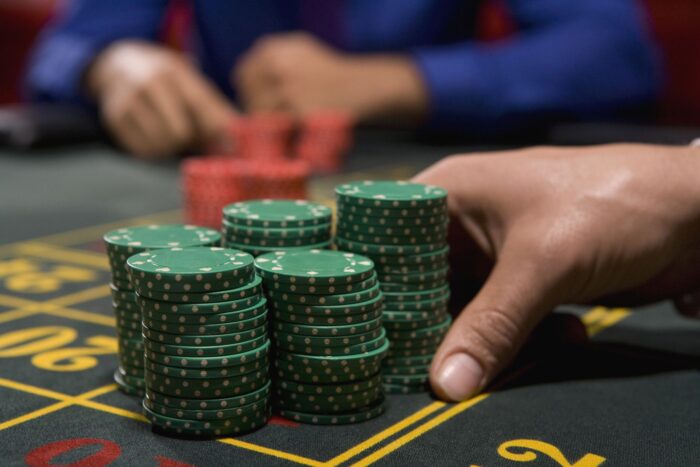Do you ever wonder what it is that drives athletes to gamble? Do their sportsperson instincts help or hinder them?
Unravel the psychology of athletes and gambling to find out the potential risks and benefits of engaging in betting activities.
The Rise of Gambling in Sports

Source: variety.com
Sports gambling has been on a steady rise in recent years, with more and more athletes engaging in various forms of betting. This rise calls upon psychology to understand why this surge is occurring and what role factors like celebrity, economic well-being, risk-taking behavior, and societal norms play into these decisions.
As gambling sites such as shangrila.com continue to present itself as becoming more socially acceptable and available, athletes must face both positive and negative implications when considering whether or not to participate in sports betting activities.
Gambling’s appeal is especially attractive to athletes whose jobs hinge on performance-based incentive contracts; the potential payoff of gambling may prove too difficult for some players to pass up. Although this opportunity may be seen as a potential win in the short-term, long-term consequences such as unpaid debts or convictions could have much greater effects that could potentially threaten an athlete’s career.
Beyond financial motives, psychological factors can also contribute greatly to sports gambling behaviors – such as impulsivity traits that are fuelled by highs associated with competition can lead players down dangerous paths when seeking additional stimulation for their opportunities for wins. Exposure to teammates participating in frequent gambling behavior can become persuasive influences. Finally social media’s presence only adds to the problem at hand; the popularity that comes from the professional sports industry only feeds into an ever-growing prevalence of illegal activities associated with betting.
All of these attractions have led today’s athletes astray from traditional sporting values of good health and fair play – further amplifying our need for understanding the connection between psychology and athletes’ gambling habits before any further damage is done.
The Impact of Gambling on Athletes

Source: rccbank.in
It can be an extremely addictive and damaging activity for professional athletes, who are already under considerable stress in an environment that often encourages risk-taking. As professional athletes become increasingly integrated into popular culture, the pressure to perform can be intensified by the opportunity to make money through gambling. Research indicates that the prevalence of gambling is oftentimes higher among professional athletes than their non-athletic counterparts.
The most commonly known type of athlete gambling is sports betting. This typically involves wagering money on the outcome of a sporting event, such as predicting the winner of a game or race. Other forms of it include playing poker, fantasy sports, horse racing, casinos and lottery tickets. To further complicate matters, some athletes have been found to participate in illegal activities such as illegal sports betting or match fixing. While these activities often have serious repercussions for those involved, the psychological impact cannot be discounted; neglected issues may eventually lead to behavioral problems such as addiction or depression.
It has been linked with a range of psychiatric symptoms including depression, anxiety and impulse control disorders (e.g., binge eating). These cases demonstrate how psychologically detrimental involvement in gambling can be for athletes; failure to take preventive steps could lead to even more serious issues down the line. As psychologists continue to explore this relationship between athlete performance and psychological health in relation to gaming activities, understanding prevention measures like education and awareness is essential – particularly given how vulnerable being an athlete makes one individual prone to this personal issue as well as potential financial ruin outside of sport boundaries when not managed properly.
The Role of Money in Gambling

Source: methodshop.com
Gambling, like many activities, often has a monetary component. For athletes, this engagement in gambling can be a motivating factor when they compete and gamble on the outcome of their games. In their search for excitement or the potential reward of financial gain, many professional athletes turn to it.
Though the motivation leading to gambling is typically the same among all players — instant gratification or potential financial rewards — those motivations vary when seen across different sports. Professional athletes playing in individual sports such as golf or tennis are more likely to seek out financially rewarding opportunities through legal and illegal forms of gaming while team sport participants are more likely to engage in recreational or social gambling activities without expecting large monetary gains.
The money involved in sports wagering also provides greater incentives for players to fix matches in an attempt to boost their profits, and indicates a greater risk of game integrity violations within the context of professional sport. This sets up ideal conditions for match-fixing which can heavily damage team sport communities and sets a dangerous precedent for the near future, making it incredibly important for organizations and leagues that focus on sports competition take part in combating game corruption through pre-emptive education measures and diligent monitoring systems throughout all levels of organized competition.
The Effects of Gambling on Performance

Source: verywellmind.com
It can have a dramatic impact on the performance of athletes both on and off the field. Through a series of studies conducted by the University of Louisville, researchers evaluated how gambling activities affected physical, psychological, and social aspects of athletes’ lives.
The physical effects that were observed include higher levels of fatigue, decreased energy levels, and reduced agility. On the psychological level, athletes were found to be more prone to anxiety-related issues such as racing thoughts and jitters prior to competition. Additionally, losing bets made athletes more likely to become discouraged or unmotivated about their future prospects as an athlete.
Finally, the social effects studied included increased isolation from friends and family due to embarrassment over losses or negative attitudes towards gambling in general. Athletes also experienced difficulty connecting with teammates if they viewed gambling as immoral or socially unacceptable behavior. These studies demonstrate that gambling can have a serious impact on an athlete’s physical performance, mental health, and relationships with peers.
Conclusion
Therefore, it’s important for teams, coaches and athletes themselves to be aware of the dangers associated with gambling while also learning how they might benefit from leveraging it in savvy ways. By understanding the psychology behind why athletes turn to gambling in certain situations and scenarios, we can create strategies that encourage healthy habits while also providing safety nets when needed. With knowledge comes responsibility — with proper awareness and education of the connection between elite athletes and betting, we can protect our beloved sports stars while still enjoying the thrill of competition.
